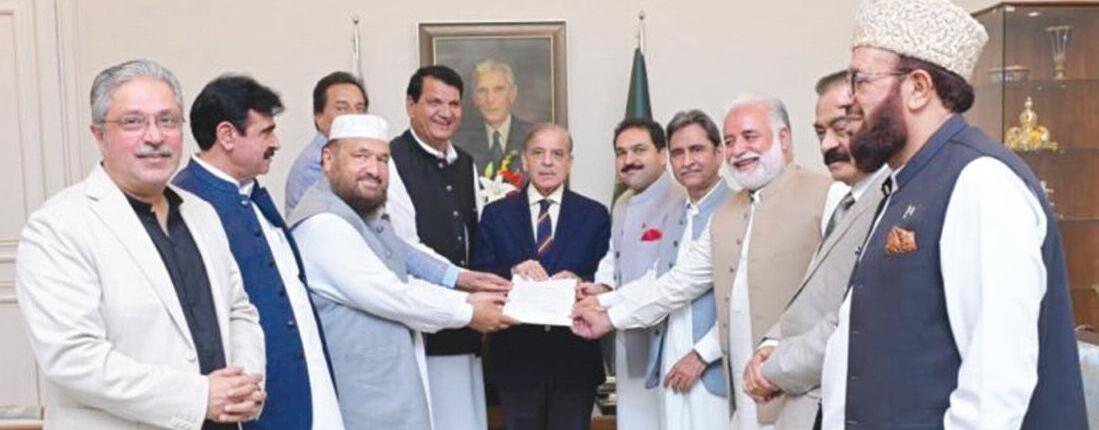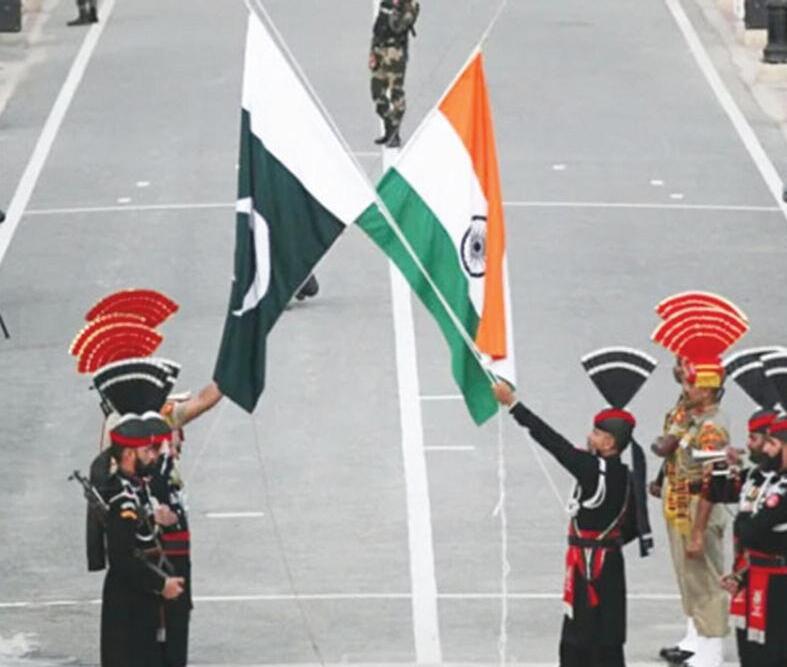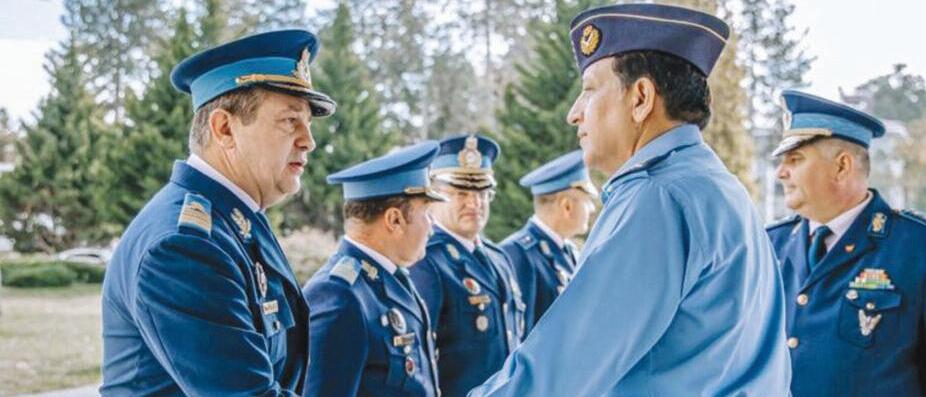

urgeS uNit Y, fASter uPlift AS KP–CeNtre teNSioNS deePeN
g PREMIER SHEHBAZ MEETS PARTY ’S LAWMAKERS FROM KP, REVIEWS PROVINCE S DEVELOPMENT PROJECTS
g CALLS FOR ‘SUSTAINED POLITICAL ENGAGEMENT’ TO ENSURE PROVINCIAL STABILITY AND GROWTH g STRESSES KP ’S CENTRAL ROLE IN NATIONAL DEVELOPMENT AGENDA, A SKS AUTHORITIES TO EXPEDITE WELFARE, INFRA STRUCTURE SCHEMES
S ta f f R e p o R t
R I M E M I N I S T E R Shehbaz Sharif on Wednesday met lawmakers and political leaders from Khyber Pakhtunkhwa (KP) to discuss the province s development priorities and the country’s evolving political situation, amid growing friction between the PTI-led KP government and the Centre over counterterrorism policy and fiscal rights
According to a statement issued by the Prime Minister s Office (PMO), the meeting reviewed the overall political landscape” and progress on ongoing federal development projects in the province The premier directed the relevant authorities to expedite key infrastructure and welfare initiatives stressing that KP remains a key priority in the national agenda
The discussion, held at the Prime Minister ’s Office focused on federal efforts to promote socio-economic development in KP and enhance coordination between the Centre and provincial stakeholders, the state-run Associated Press of Pakistan (APP) reported The prime minister underscored the “need for sustained political engagement to ensure stability and growth in the province ” reaffirming that national progress required cooperation between all federating units
The meeting comes at a time when relations between the federal and KP

governments have grown increasingly tense, particularly over counterterrorism operations and fiscal matters
The PTI, which has governed KP since 2013 has opposed full-scale military operations against militants arguing that such measures cause civilian displacement in tribal districts Earlier this week, KP Chief Minister Sohail Afridi accused the Centre of pursuing a “flawed policy” that, he claimed, had contributed to the recent resurgence of terrorism in the province He further alleged that Islamabad had withheld funds allocated under the country s war on terrorism, along with other constitutional rights due to KP Pakistan has witnessed a sharp uptick in terrorist attacks since November 2022 when the
banned Tehreek-i-Taliban Pakistan (TTP) unilaterally ended its ceasefire with the state and resumed hostilities, targeting security personnel, police, and other law enforcement agencies particularly in KP and Balochistan Officials at the meeting reiterated the federal government s commitment to supporting the province in its development and security challenges while calling for a unified national approach to counterterrorism and stability
Earlier, Prime Minister Muhammad Shehbaz Sharif lauded the services of Federal Secretary for Information and Broadcasting
Pakistan slams renewed Israeli strikes in Gaza, urges swif t global action
More than 100 airstrikes were carried out on Sunday in Rafah
support for the Palestinian cause, the statement reiterated Islamabad’s long-standing position on the establishment of “an independent sovereign viable and contiguous State of Palestine based on pre-June 1967 borders with Al-Quds Al-Sharif as its capital Pakistan was among eight countries that had earlier worked with former US President Donald Trump s administration on a peace framework aimed at ending Israeli military operations in Gaza POLL SHOWS MAJORITY OF AMERICANS BACK PALESTINIAN STATEHOOD: Meanwhile a new Reuters/Ipsos poll revealed that most Americans including 80 percent of Democrats and 41 percent of Republicans support the recognition of a Palestinian state, underscoring growing public divergence from Trump’s stated opposition to such recognition



PAKISTAN RANKED AMONG LEAST RESILIENT
INVESTMENT
o m in a n t f o r c e i n t h e i n s u r a n c e s e c t o r w h e r e i t s f l a gs h i p c o m p a n i e s I G I G e n e r a l I n s u r a n c e a n d I G I L i f e I n s u r a n c e , a r e m a r k e t l e a d e r s a n d h a s s t r a


WOMEN’S BANK ACCOUNTS IN PAKISTAN RISE TO 37M AS GENDER

TAudit uncovers Rs10.2b irregularities, loan defaults, governance failures in ZTBL
subsidised lending schemes including the Kisan Package and Kissan Dost Scheme, where loans worth Rs923 million were issued without verifying land ownership, project feasibility, or borrower identity Some disbursements were made using fake CNICs incomplete documentation or unverifiable beneficiary data In addition unjustified
loans Of the total irregularities Rs6 8 billion were linked to non-recovery of loans from defaulters who had pledged assets or guarantees The report noted that ZTBL neither initiated timely recovery proceedings nor enforced collateral allowing borrowers to evade repayment Another Rs1 26 billion was tied to irregular loan renewals and unauthorised rescheduling where defaulters received new financing without credit reassessment or board approval a violation of the State Bank of Pakistan s prudential regulations and corporate governance rules The AGP also flagged irregularities in government-
26th Amendment does not bar full cour t from hearing c ases fixed before CB: Justice Ayesha
CONTINUED FROM PAGE 01
Advocate Khwaja Ahmad Hosain representing veteran politician Afrasiab Khattak continued his submissions urging that the matter be referred to a full-court bench comprising all available Supreme Court judges He argued that the judiciary’s reputation “does not depend on the 26th Amendment” and that an “independent full court” should hear the challenge to a constitutional provision affecting the entire institution
EXCHANGE ON BENCH’S AUTHORITY
Justice Mandokhail interjected, asking whether the counsel distrusted the existing bench Hosain clarified that he did not question the judges independence but maintained that procedurally, a decision on Article 191A which created this Constitutional Bench should be taken by the original full court ” Justice Rizvi noted that Hosain’s petition explicitly mentioned the phrase original full court Justice Mandokhail pressed the point further: You yourself said that the case should be before another independent bench Will we be included in that independent bench?”
Presiding judge Justice Aminuddin Khan added Would the Chief Justice of Pakistan, Justice Yahya Afridi, be a part of that independent bench?” to which Hosain replied in the affirmative Justice Mandokhail then questioned the counsel: “If this bench cannot hear the case how could it issue any order? Hosain responded
that the federal government had not raised any objection to either a full court or the present bench issuing directions Why is the court seeking a path to issue an order?” he asked Justice Aminuddin observed that lawyers had advanced differing constitutional interpretations and that the bench s questions stemmed from the need to test those arguments Justice Mandokhail added that some counsel had even suggested “keeping the amendment aside ” DEBATE ON THE SCOPE OF ARTICLE 191A At one point Justice Mazhar remarked that if all 26 judges of the Supreme Court were included, it would become a regular bench rather than a constitutional one ” Hosain agreed Justice Mandokhail referred to arguments made a day earlier by Dr Adnan Khan who had contended that the Supreme Court and the Constitutional Bench were separate entities Justice Mazhar added that some lawyers believed other judges could still be inducted into the current bench Hosain countered that the CB itself remained a bench of the Supreme Court
Justice Ayesha Malik then directed the counsel to read Article 191A alongside Clause 3, which stipulates that “no bench of the Supreme Court other than a Constitutional Bench shall exercise the jurisdictions listed under Article 184 including the court s original jurisdiction
She observed that the text merely specified which bench could exercise certain powers; it did not bar a full
court from doing so For some reason we read it as an ouster that no one else will hear it It simply says no other bench will do it, she said Justice Ayesha elaborated that even if Article 191A were interpreted restrictively it only meant that the CB would hear cases invoking the Supreme Court s original jurisdiction and constitutional interpretation Where is the bar? she asked If the CB interprets the Constitution and determines that a full court may hear a constitutional amendment case would that not make sense?
She reiterated I in the first case said I don t see a bar describing Article 191A as a procedural provision that imposed limits on benches but not on the Supreme Court as an institution
COUNSEL: ‘JUDGES’
POWERS REMAIN INTACT
Justice Mazhar expressed complete agreement with Hosain s contention that a 16-member full bench would be a regular bench rather than a CB The lawyer argued that the judges’ inherent powers to interpret the Constitution had not been curtailed If Parliament tomorrow decides under a 27th Amendment that an executive officer will preside over the Supreme Court, will you not be able to review it? You certainly can,” he said Hosain further contended that the 26th Amendment had not been passed following proper constitutional procedure a question Justice Mazhar noted, that could be addressed when the attorney general for Pakistan (AGP) presents arguments on the merits

P E A K I N G at the launch ceremony on Tuesday in Islamabad for the Initiative to Nurture Semiconductors Professionals for Industry, Research and Education (INSPIRE), Prime Minister Shehbaz Sharif said that it was a milestone in the country s transition towards a knowledge-based economy The programme is part of the Information Technology Ministry’s Semiconductor Roadmap which foresees the country becoming part of the semiconductor market The rapid growth of that market can be seen from the fact that while presently valued at $600 million a year it is expected to reach $1 trillion by 2030 The INSPIRE programme is designed to develop a workforce which could meet the needs of tomorrow The Planning Ministry is to allocate Rs 5 billion for this programme, which is supposed to bring academia and industry together
There is the danger of jumping on the bandwagon when it is too late Pakistan has not concentrated on educating its youth, and if the realization has seeped in that Pakistan can only stay ahead of its rivals if its people are educated enough to innovate that is welcome It did seem that the government and all of its predecessors were satisfied for Pakistan’s people to be more worker bees capable only of imitation whose only merit was that they could make things cheaper (but not necessarily better) than the
PA K I S TA N has been one of the nations hardest-hit by terrorism losing thousands of lives while fighting to restore regional stability Despite the proxies war waged by its neighbouring states it showed resolve to advocate for dialogue and peaceful coexistence with all its neighbours Its foreign policy remains anchored in mutual respect non-interference and the pursuit of lasting regional peace Through consistent counterterrorism efforts Pakistan has proven its commitment to defeating terrorism and extremism and promoting stability across South Asia
Since returning to power in August 2021, time and again the Taliban have given assurances to the international community and neighbouring states that Afghan’s soil under their rule would no longer serve as a safe haven for transnational terrorist groups Statements have emphasized non-interference respect for international borders and counterterrorism cooperation However, numerous reports, analyses and intelligence assessments suggest a contrasting reality: a policy of tacit and at times active, patronage of certain militant groups particularly the Tehrik-eTaliban Pakistan (TTP) Al-Qaida and IS-Khorasan (IS-K) This tension between promise and practice has significant implications for regional security diplomatic relations and the credibility of Taliban governance While the Taliban s statement reflects a desire for legitimacy, the observed behaviour tells a more complex story Several credible sources outline evidence that contradicts the public pledges

According to UN Security Council monitoring reports the Taliban regime has allowed safe havens for operational and logistical spaces to the TTP New training camps have reportedly been established and expanded in border provinces such Kunar, Nangarhar, Khost and Paktika UN monitoring reports suggest that Al-Qaida remains active in several Afghan provinces under the Taliban regime IS-K has continued to conduct attacks inside Afghanistan and there is evidence of overlapping or contested areas of influence between IS-K and the Taliban, particularly in eastern provinces The United State Institute of Peace has also stated that analysts note ideological proximity, shared networks and historic connections between the Taliban and TTP, which complicate purely coercive containment Pakistan has provided evidences to the international community about attacks originating from Afghanistan under the patronage of the Taliban Pakistan has also communicated this to the Taliban top leadership who gave verbal assurances to Pakistan but failed to implement them on ground Pakistan has hosted 4 5 million Afghan refugees
for more than four decades extending humanitarian support through access to housing health care education and livelihood opportunities despite internal challenges Afghanistan is a landlocked country and Pakistan has been facilitating it by providing access to its ports and other trade facilities through its borders on humanitarian grounds despite attacks from its soil Through consistent diplomatic channels including China Russia Saudi Arabia and Qatar Pakistan has urged the Taliban top leadership to prevent militant groups particularly the TTP from using Afghan territory for cross border terrorism, stressing that such activities are a threat to regional peace and stability The recent devastating terrorist’s attacks on Pakistan armed forces, including the attack on the DI Khan police training centre compelled Pakistan to adopt a clear stance On October 9 the Taliban foreign minister Amir Khan Muttaqi while on a visit to India has publicly denied that the Taliban harbour the TTP inside Afghanistan He asserted that militancy in Pakistan is largely an internal issue and criticized Pakistan for attributing all problems to Taliban In response Pakistan’s FO strongly rejected his remarks saying Taliban had been repeatedly confronted with evidence of militant groups using Afghan soil to attack Pakistan October 10 a Pakistan Army spokesman, addressing a press conference in Peshawar, stated that in the last two years 1093 Pakistanis, including civilians and armed forces personnel, embraced martyrdom while 1786 terrorists,

The gap between peace promises and terror patronage reflects both the legacy of decades of conflict and the complex challenges of rebuilding a state under constrained conditions. But for lasting peace and regional stability, word must be matched by deeds. The test for the Taliban regime is not what it declares, but how it handles the hard, often unpopular, work of restraining militant networks-including those with ideological or tribal affinity and enforcing the rule of law


Türkiye, was no symbolic gesture, it was a structured accord built on Pakistan s terms of verification, visibility, and accountability By drawing in trusted mediators, Pakistan elevated its security concerns from bilateral complaint to internationally recognized obligation The agreement s core is clarity: an immediate ceasefire mutual restraint against cross-border militancy, and a verified follow-up process, beginning with the Istanbul dialogue later this month These provisions move beyond platitudes of “brotherhood” to enforceable responsibility For Pakistan the achievement is twofold; it compelled the Taliban to acknowledge its security red lines and turned years of ignored demands into an actionable, monitored framework Beyond the ceasefire itself, the real diplomatic breakthrough lies in the architecture of the agreement and the actors who helped shape it The inclusion of Qatar and Turkiye as mediators transformed what might have remained a bilateral reset into a regionally anchored security framework Their involvement carries political weight and diplomatic credibility, ensuring that Pakistan s concerns over crossborder terrorism are no longer dismissed as unilateral grievances but recognized as shared regional imperatives By positioning trusted Muslim partners as guarantors Islamabad not only gained neutral oversight but also embedded verification and follow-up mechanisms into the accord, a longstanding demand finally realized This internationalization of Pakistan’s security stance adds a layer of accountability for Kabul: every breach or delay will now unfold under external observation In effect Pakistan has redefined its counterterrorism struggle from an isolated defence effort to a monitored regional responsibility backed by allies who understand both its stakes and its restraint
The Doha Agreement’s significance extends well beyond the borderlands it reshapes Pakistan s regional calculus By enforcing accountability on the Afghan Taliban and curbing the space for militant proxies, Islamabad has not only secured its western flank but also undercut India’s long-standing strategy of exploiting Afghan instability to pressure Pakistan This shift carries deep geopolitical weight:

with the western border stabilizing Pakistan can reorient its focus toward economic integration and strategic partnerships spanning China, Turkiye, and Central Asia A secure frontier strengthens the foundations of regional connectivity, from CPEC to prospective trade routes linking South and West Asia while projecting Pakistan as a responsible actor capable of coupling security with diplomacy
The message resonates across the region: stability is no longer negotiable, and Pakistan s path to it runs through strength, strategy, and self-assured leadership
This Doha Agreement marks a milestone in Pakistan s pursuit of secure and responsible regional engagement For the first time every aspect of Pakistan-Afghanistan relations from trade to border movement, is tied to a single, non-negotiable condition: the removal of antiPakistan terror groups from Afghan soil Islamabad’s military and diplomatic apparatus have shown that strength and strategy can work hand in hand delivering tangible leverage without reckless escalation Yet vigilance remains essential: the Taliban s past record underscores the need for a unified national approach, close monitoring through Qatar and Türkiye, and readiness to act if commitments falter With the world watching Pakistan has the opportunity to shape a durable regional security framework one rooted in accountability zero tolerance for terror sanctuaries, and the unmistakable message that peace is welcome, but never at the cost of Pakistan s sovereignty
The writer ican be reached at zartajchaudhary@gmail com
Yet vigilance remains essential: The TalibanÊs past record underscores the need for a unified national approach, close monitoring through Qatar and Türkiye, and readiness to act if commitments falter With the world watching, Pakistan has the opportunity to shape a durable regional security framework one rooted in accountability, zero tolerance for terror sanctuaries, and the unmistakable message that peace is welcome, but never at the cost of PakistanÊs sovereignty
The
It affec ts the whole of Asia
Zartaj Chaudhary

Middle East tensions and Pakistan’s Militar y Imperative


QATA R a country that has often played a diplomatic role in mediating Israeli-Palestinian tensions, was targeted in a recent Israeli drone strike that sought to eliminate Hamas negotiators on its soil Although the strike caused regional outrage and was condemned by the UN there was no military consequence for Israel Qatar like many Gulf states lacks a significant military deterrent and relies heavily on diplomatic channels and foreign military partnerships for its security The absence of any credible threat of retaliation allows Israel to calculate that the benefits of neutralizing perceived enemies outweigh the potential costs
This once again illustrates how the lack of military power in Middle Eastern countries enables Israel to extend its operations across the region with minimal constraints For Arabs and Muslims, the repeated images of Israeli warplanes bombing Palestinian neighbourhoods of soldiers raiding refugee camps and civilian deaths occurring without any form of accountability are a source of humiliation and anger The inability of their governments to respond in any meaningful way militarily or diplomatically leads to a sense of helplessness further weakening the legitimacy of those regimes in the eyes of their people
In some cases this power vacuum has fueled radicalization and the growth of extremist groups who promise to resist the occupation unconventionally Thus, the absence of strong national armies not only enables Israeli aggression but also destabilizes the internal dynamics of the region by creating fertile ground for non-state actors to rise and challenge the Arab regimes that fail to defend their people
The Israeli strategy of regional dominance thrives in a context where there is no serious conventional threat to its military superiority This imbalance of power allows Israel to dictate the rules of engagement set
the tempo of conflict and operate across borders with near-total air superiority Until the countries of the Middle East develop strong, unified, and self-reliant military capabilities alongside the political will to act collectively Israel’s aggressive actions are likely to continue unchecked The establishment of such deterrence is not merely a matter of military hardware or numbers but requires comprehensive reform strategic unity and the political courage to challenge decades of division and foreign dependency Without it, the people of Palestine and the wider region will continue to suffer the consequences of an unequal conflict and peace will remain a distant ideal rather than an achievable goal Pakistan s military stands among the most capable and battle-hardened forces in the Muslim world Rooted in the geopolitical complexities of South Asia and the broader Islamic world, the strength of the Pakistan Army is not merely a matter of national pride but a crucial necessity for the country s survival sovereignty and strategic relevance In recent years especially following the aggression by Israel in Palestine, Qatar, and Yemen, the justification for Pakistan to not only maintain but further enhance the strength of its armed forces has grown even more apparent These events have underscored a brutal global reality: only those nations that possess strong self-reliant and technologically advanced armies can deter external threats and protect their sovereignty Pakistan, therefore, must see its military strength not merely as a matter of national defence but as a pillar of regional stability Islamic solidarity and strategic deterrence Pakistan has long viewed its military as a vital element of state power forged in the crucible of wars with India and the challenges of internal and external terrorism Its army has demonstrated its resilience in counter terrorism operations across the tribal
areas, its strategic planning in conventional war settings, and its deterrence in the nuclear realm Yet the evolving global military landscape shaped by fifth-generation warfare drone technology cyber warfare spacebased surveillance and artificial intelligence-driven combat systems, demands that Pakistan does not rest on past laurels The recent Israeli operations used precision-guided munitions deep-penetration drone strikes real-time satellite intelligence and advanced cyber capabilities to destroy targets hundreds of miles away from their borders
To counter such threats or to develop the capability to respond in kind if needed, Pakistan must accelerate its investment in advanced defense technologies, improve its surveillance and air defence systems enhance its cyber warfare units and refine its military doctrines to deal with modern hybrid threats The attack on Qatar was a turning point Israel s decision to strike inside Qatari territory under the pretext of targeting Hamas-linked figures revealed that even nations without overt hostilities could be violated if they are perceived as weak or defenceless If Qatar with its wealth and international connections can be struck it raises alarming questions about the security of other Muslim nations Pakistan, as a vocal supporter of the Palestinian cause and a major Muslim power must interpret this incident as a wake-up call It can no longer afford to rely solely on diplomatic protests or Islamic solidarity forums that have repeatedly failed to deter such acts Only a strong military can provide the real leverage needed in today’s ruthless international system The destruction in Palestine show that oppression thrives where military resistance is absent or ineffective For decades the people of Gaza and the West Bank have suffered under occupation Despite the immense global sympathy for the Palestinians, no country has been able to intervene militarily In this context the idea of a strong independent Muslim military power becomes
not just strategic but moral Pakistan, with its ideological foundation rooted in Islamic values and its stated commitment to defending the Ummah must recognize that its military is not only a national asset but a potential force for regional balance and collective Muslim deterrence While Pakistan is not advocating offensive wars or unjust interventions, the presence of a strong army backed by advanced technology rapid response capabilities and strategic alliances sends a message that there are red lines that cannot be crossed without consequences
Another critical dimension is the growing normalization of Israel with several Arab countries The Abraham Accords and subsequent bilateral agreements between Israel and Gulf states have created a fragmented regional environment where collective Arab resistance to Israeli aggression is weakening In such a scenario, Pakistan s military independence becomes even more important As traditional Arab powers grow closer to Tel Aviv for economic and strategic reasons the moral and military responsibility to advocate for justice and defend the oppressed shifts towards countries that have not compromised on their principles Pakistan, by not recognizing Israel and maintaining a consistent stance on Palestine, becomes a unique and vital player in the Muslim world one whose military strength ensures that its voice carries weight In addition to regional dynamics Pakistan must also consider the lessons from history The 21st century has shown repeatedly that nations without a strong army are vulnerable to both external aggression and internal destabilization Iraq Libya and Syria were all targeted under the pretexts of regime change counterterrorism or humanitarian

For Pakistan, whose ideological foundation includes standing for justice and defending the oppressed, especially in the Muslim world, these events are not distant or irrelevant They are a call to vigilance , to strategic foresight, and to the strengthening of ever y pillar of national defense A strong er Pakistan Army is not just a national requirement it is a regional necessity, a symbol of hope for the voiceless, and a shield against the increasing militarization of injustice in todayÊs world
The animalistic behavior of US envoy towards Lebanon intensifies
Those who gamble on American protec tion are, in truth, handing the keys of their homeland to the ver y hands that seek its destruc tion! Washington views any refusal to normalize with Israel as a defiance of its Middle Eastern blueprint, a challenge to be crushed rather than understood
N
IBarrack’s remarks are not isolated slips of the tongue They form part of a systematic pattern of coercion and blackmail that reflect the deeply entrenched arrogance of Washington s diplomacy towards sovereign nations Barrack s message to Lebanon was chillingly clear: submit to Washington’s will and normalize with Tel Aviv or face chaos, collapse and destruction This tone of political thuggery exposes what lies beneath the rhetoric of peace and stability the U S so often parades: a neocolonial project aimed at subjugation, not coexistence In one of his earlier interviews with Sky News Arabia, Barrack cynically declared, “There is no such thing as peace There is one party that wants to control and subjugate others This blunt confession unmasks the essence of American foreign policy a philosophy of dominance cloaked in the language of diplomacy His latest threats merely reaffirm that Washington’s vision for Lebanon is not one of partnership but of total obedience to the American-Israeli axis Even more alarming Barrack s statements effectively undermine the November 2024 ceasefire agreement casting doubt on Washington s commitment to any negotiated settlement By linking the truce s continuation to Hezbollah’s disarmament, the U S envoy is weaponizing diplomacy itself transforming peace initiatives into instruments of blackmail His language has long transcended diplomatic decorum; it has become a direct declaration of economic, political, and military coercion According to Barrack s logic, the Abraham Accords are the new compass of American strategy in the region Washington views any refusal to normalize with Israel as a defiance of its Middle Eastern blueprint a challenge to be crushed rather than understood Lebanon therefore is being positioned as a testing ground for this imperial experiment: a nation coerced through hunger, sanctions, and threats of war until it capitulates This is not the first time Barrack has adopted the tone of a colonial overseer Since his appointment he has issued at least four explicit threats He once proposed annexing
missed the concept of peace entirely boasting of a plan for control rather than reconciliation On another occasion, he hinted at arming the Lebanese army to fight its internal opponents” a barely veiled reference to the Resistance His latest and most dangerous provocation warning of civil war if Lebanon does not normalize with Israel completes a pattern of sustained aggression The ultimate goal of this rhetoric is clear: to impose submission Yet, Barrack and his superiors seem oblivious to Lebanon s long history of defiance The Lebanese have faced Israeli occupation internal strife and economic siege but refused to kneel down Since 1982 the logic of resistance has been the only force capable of preserving the country s sovereignty and dignity Internally, the Lebanese government s response remains lukewarm, shackled by an economic crisis largely engineered by the same powers now preaching “reform” The Ceasefire Monitoring Committee supposedly established to ensure stability has turned into a platform to impose new Israeli conditions without any reciprocal obligations, such as withdrawal from occupied lands or the return of displaced civilians Besides, the so-called “step-by-step” policy has failed miserably as Israel has never sought peace Israel seeks violent expansionism full domination and the erasure of any resistance Washington as the principal sponsor of this charade, bears full responsibility for perpetuating Israeli aggression and sabotaging genuine peace Barrack’s economic threats, too, are hypocritical Crisis in Lebanon did not begin yesterday It was orchestrated in 2019 through Washington s financial blockade and punitive sanctions which crippled its economy and blocked potential relief from Iranian energy and reconstruction offers Meanwhile, Lebanon stands at a crossroads: to yield to the humiliating logic of normalization or to uphold its dignity and independence The choice however is not merely political it is existential! A people who once declared humiliation is out of our reach cannot be forced to choose between starvation and surrender History has shown that every time external pressure mounts, the Lebanese people’s attachment to resistance only deepens Barrack’s animalistic threats will not succeed in taming a nation forged in struggle The real response lies not in diplomatic complaints but in decisive action namely Lebanon s withdrawal from the failed ceasefire supervision committee and the reaffirmation of a national doctrine that places sovereignty above submission Dignity is not a negotiable currency; those who gamble on American protection are in truth handing the keys of their homeland to the very hands that seek its destruction!
The


E N
Won October 4 that they were suing the Church of England for enabling the brutal abuse they suffered at the hands of John Smyth, a leading figure in its evangelical movement, their action was not only about justice for the past It was an indictment of an institution that has never reckoned with the violence it spread under the banner of faith Smyth was not an isolated predator He was part of the Church s powerful inner circle A respected British barrister as well as an evangelical leader, he oversaw Christian camps in the United Kingdom Zimbabwe and South Africa where more than 100 boys and young men were abused He embodied the authority and social privilege that shielded him from scrutiny When reports of his abuse first surfaced in England in the early 1980s, the Church chose silence over accountability allowing him to carry his cruelty to Africa In Zimbabwe his victims were boys from Christian camps among them 16-year-old Guide Nyachuru, who was found dead in a camp swimming pool in 1992 More than three decades later, Nyachuru’s family has joined six other survivors in a lawsuit against the Church demanding accountability for both the abuse and the Church s deliberate inaction That history has now returned to haunt the Church What began as the concealment of one man s crimes has become a symbol of a much older truth: the Church of England’s authority in Africa was never only spiritual It was built on conquest complicity and the sanctification of empire On November 7 2024 the Makin Review an independent inquiry established to investigate the abuse perpetrated by Smyth, delivered its long-awaited findings The report was damning It revealed how senior Church figures had systematically concealed his crimes for decades treating him as a problem solved and exported to Africa Four days later Archbishop Justin Welby resigned, accepting both personal and institutional responsibility for what survivors described as a decades-long conspiracy of silence His departure marked a symbolic moment of accountability but of-
fered little comfort to those who endured Smyth’s brutality With Sarah Mullally now archbishop-designate survivors have urged the Church to use this transition as an opportunity for real accountability rather than another gesture of regret My family grew up under the long shadow of the Anglican Church I was baptised in the Anglican Church in Kambuzuma and christened at St Paul’s in Marlborough For that reason I feel both bound to the Church and deeply ashamed of that bond Like many others I never fully confronted its past or present brutalities At independence from Britain in April 1980, Prime Minister Robert Mugabe a devout Catholic promoted a policy of reconciliation that urged forgiveness without truth and progress without justice After decades of colonial rule we were told to move on, never to look back and ask who we had been before the Berlin Conference of 1884 For 45 years since, there has been no serious effort to hold the Church accountable for its expansive role in Zimbabwe s colonisation In 1890 when Bishop George KnightBruce blessed the Pioneer Column a paramilitary expedition funded by the British South Africa Company (BSAC) to seize Mashonaland and Matabeleland for the empire the Anglican Church positioned itself as the spiritual arm of conquest Knight-Bruce and his successors saw empire and evangelism as inseparable tools of divine order They acquired extensive tracts of land seized by the BSAC while preaching salvation through submission to the colonial state By the turn of the 20th century the Anglican Church had established mission stations at St Augustine s St Faith s and St David s (Bonda) in Manicaland These were not schools at their inception but evangelical outposts, centres for conversion, settlement and the consolidation of colonial authority that later evolved into major educational and medical institutions They also trained and disciplined African labour for the colonial economy teaching obedience and industry as Christian virtues in the service of the empire The pulpit became a weapon of assimilation, and the classroom a tool of subtle erasure and indoctrination In sermon and scripture alike subjugation was camouflaged as enlightenment The colonisation of Zimbabwe was at its core, a commercial enterprise, and the Church of England profited morally, spiritually and materially
TEHRAN TIMES
abdul basiT alvi
JAZEERA



PUNJAB TRAINS OVER 180,000 YOUTH UNDER CM
SKILLS INITIATIVE
24 state-of-the-art construction labs across the province including Bahawalpur Multan Bhakkar and Mianwali to train 2,450 youth in modern construction techniques So far, 830 trainees have completed their courses, 1,178 are enrolled, and 975 will join the next batch The Hospitality Training Programme has also gained momentum with 96 youth having
introducing the Maryam Nawaz Free Travel Card to facilitate skilled youth seeking overseas job opportunities Officials informed the meeting that to modernise the construction sector the Punjab government had established










Air Chief ’s visit marks new phase in Pakistan–Romania military collaboration
ISLAMABAD S ta f f R e p o R t
In a major step toward deepening bilateral defence cooperation, Chief of the Air Staff, Air Chief Marshal Zaheer Ahmed Baber Sidhu, undertook a landmark official visit to Romania, where he held wide-ranging talks with Lieutenant General Leonard-Gabriel Baraboi Chief of the Romanian Air Force Staff according to the military s media on Wednesday In a statement, the Inter-Services Public Relations (ISPR) said the visit underscored Pakistan’s growing engagement with European defence partners and its focus on advancing collaboration in modern air power and aerospace technology Upon his arrival at the Romanian Air Force Headquarters, Air Chief Marshal Sidhu was presented with a Guard of Honour by a smartly turnedout contingent of the Romanian Air Force The two Air Chiefs later held indepth discussions aimed at expanding operational cooperation through joint air exercises, professional exchange programmes, and the training of air and ground crew the statement said Both sides also exchanged views on regional security dynamics and reaffirmed their shared resolve to strengthen cooperation for global and regional stability Lieutenant General Baraboi lauded the Pakistan Air Force’s professionalism citing its recent operational successes and notable advancements in indigenization achieved under the visionary leadership of Air Chief Marshal Sidhu, the ISPR reported During the talks, the two dignitaries agreed to establish robust institutional mechanisms to ensure sustained

collaboration between the two air forces They also explored opportunities for defense-industrial partnerships particularly in advanced aerospace technologies to enhance mutual capability and interoperability
The Air Chief s visit to Romania marks a significant milestone in Pakistan–Romania military relations symbolizing a renewed commitment to peace progress and partnership in an increasingly complex global security environment It also reflects Pakistan s strategic outreach to broaden its defence diplomacy and diversify cooperation with technologically advanced air forces

”
there seems little hope of any positive change the minister remarked He reiterated that if Afridi genuinely worked for stability in Khyber Pakhtunkhwa the federal government would extend full cooperation

